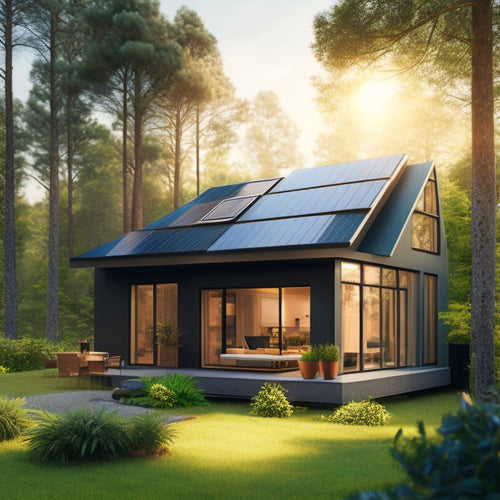
What's the Average Solar Panels Cost
Share
You're likely wondering what the average cost of solar panels is. On average, the cost ranges from $2.50 to $3.50 per watt, with a typical residential system of 5 kW costing between $12,500 and $17,500. Several factors influence this cost, including equipment quality, installation complexity, and market conditions. Additionally, government incentives and rebates can help offset the expenses associated with solar panel installation. While this gives you a general idea, understanding the subtleties of solar panel pricing and incentives can help you make a more informed decision - so it's worth exploring further to find the best fit for your needs.
Key Takeaways
- The average cost of solar panels ranges from $2.50 to $3.50 per watt, with a typical residential system (5 kW) costing between $12,500 and $17,500.
- Monocrystalline panels are the most efficient and expensive, while polycrystalline panels are more affordable but less efficient.
- Installation complexity, market conditions, and incentives can affect the overall cost of solar panels.
- The total cost of ownership includes the initial investment, maintenance, and repairs, as well as potential savings from government incentives and rebates.
- System size and quality of equipment significantly influence overall costs, with high-efficiency panels from top-tier brands being more expensive but generating more power.
Understanding Solar Panel Pricing
As you investigate the world of solar energy, understanding solar panel pricing is vital for making an informed decision about your investment.
You'll encounter various solar panel brands, each with its own unique features and pricing structures. It's important to take into account the quality and efficiency of the panels, as well as the installation techniques used.
High-efficiency panels from top-tier brands like SunPower and Panasonic typically come with a higher price tag. In contrast, more affordable options from brands like Trina and Hanwha may sacrifice some efficiency for cost savings.
Additionally, the installation method, such as roof-mounted or ground-mounted systems, will impact the overall cost.
When evaluating solar panel pricing, it's necessary to take into account the total cost of ownership, including the initial investment, maintenance, and potential repairs.
Be wary of extremely low prices, as they may indicate lower-quality equipment or installation shortcuts.
Factors Affecting Solar Panel Cost
Three primary factors affect the cost of solar panels: the type and quality of equipment, installation requirements, and local market conditions.
The type and quality of equipment you choose will greatly impact your overall cost. High-efficiency panels may be more expensive, but they can generate more power per hour of sunlight, making them a better value in the long run.
Installation requirements also play an essential role in determining your cost. If your roof has multiple angles, skylights, or other obstructions, the installation complexity will increase, driving up the cost. Additionally, if you need to upgrade your electrical panel or add a battery backup system, this will add to the overall expense.
Local market conditions, such as the cost of labor and permits, also vary by region. In areas with high demand for solar installations, prices may be higher due to increased competition.
On the other hand, some governments offer incentives and rebates that can help offset the cost. Understanding these factors will help you make an informed decision when selecting a solar panel system that meets your energy needs and budget.
Average Cost of Solar Panels
Now that you've considered the factors affecting solar panel cost, you're likely wondering what the average cost of solar panels is. The answer depends on the type of solar panels and installation methods you choose. Generally, the average cost of solar panels ranges from $2.50 to $3.50 per watt.
For a typical residential solar panel system, which is around 5 kilowatts (kW), the total cost would be between $12,500 and $17,500.
The cost also varies depending on the type of solar panel you choose. Monocrystalline solar panels, which are the most efficient, are typically the most expensive. Polycrystalline solar panels, on the other hand, are more affordable but less efficient. Thin-film solar panels are the least expensive option but have the lowest efficiency.
Installation methods also impact the cost. Roof-mounted installations are the most common and cost-effective, while ground-mounted installations are more expensive.
Additionally, the complexity of the installation, such as the need for additional hardware or permits, can also drive up the cost. By understanding these factors, you can make an informed decision about which solar panel system is right for you.
Cost Breakdown of Solar Systems
The cost of a solar system can be broken down into several key components, including the cost of the solar panels themselves, inverters, mounting hardware, and installation labor.
As you consider investing in a solar system, it's important to understand the various expenses involved.
-
You'll need to factor in installation expenses, which can vary depending on regional pricing and installation timeframes.
-
The quality of the equipment, including the panels and inverters, will impact the overall cost and performance of the system.
-
Maintenance costs should also be considered, as regular upkeep is necessary to guarantee peak energy production.
-
Financing options may be available to help offset the upfront cost of the system, and you'll want to investigate these when determining your budget.
-
The size of the system you need will also impact the cost, so it's vital to ascertain your energy needs and choose a system that meets those needs.
Solar Panel Incentives and Rebates
Government-backed programs and utility company initiatives can greatly slash your solar panel system's sticker price. You can take advantage of federal incentives, such as the Solar Investment Tax Credit (ITC), which allows you to claim a tax credit of 26% of your total solar panel system cost.
Additionally, state rebates and tax credits can provide further discounts. Financing options, including solar loans and installation grants, can also help make your solar panel system more affordable.
Local programs, such as utility incentives and community solar initiatives, can offer additional savings. Furthermore, you can sell renewable energy credits (RECs) to utilities or other companies, generating revenue from your solar panel system.
Is Solar Panel Installation Worth It
You're likely wondering if investing in solar panels is worth the upfront cost.
By installing solar panels, you'll start saving on energy costs immediately, and over time, these savings will add up.
Additionally, you'll be contributing to a cleaner environment and creating a long-term investment that will increase your property's value.
Energy Cost Savings
Your electricity meter is ticking away, racking up charges with each passing day.
But what if you could utilize the power of the sun to reduce your energy costs? With solar panels, you can. By installing a solar panel system, you'll start generating your own clean energy, reducing your reliance on the grid and slashing your utility bills.
Here's what you can expect:
-
Lower energy bills: With solar panels, you'll produce your own energy, reducing your consumption from the grid and leading to significant utility savings.
-
Increased energy efficiency: Solar panels convert sunlight into electricity, allowing you to power your home more efficiently and reducing your carbon footprint.
-
Predictable energy costs: With solar panels, you'll have a clear understanding of your energy costs, allowing you to budget more effectively.
-
Reduced peak hour consumption: Solar panels produce energy during peak sun hours, reducing your consumption during the most expensive periods.
-
Long-term savings: While the initial investment in solar panels may seem steep, the long-term savings on your energy bills will more than make up for it.
Environmental Impact Benefits
One of the most notable advantages of solar panel installation is the substantial reduction in greenhouse gas emissions. By utilizing solar energy, you'll markedly decrease your reliance on fossil fuels, which are major contributors to climate change. This change to renewable resources reduces your carbon footprint, leading to a considerable sustainability impact.
You'll enjoy ecological advantages like pollution reduction, which improves local air quality and promotes a healthier environment.
Solar panels also increase energy independence, as you'll generate your own power and reduce your reliance on the grid. With solar energy, you'll be doing your part to combat climate change and preserve natural resources for future generations.
In addition to these environmental benefits, you'll also be supporting the development of renewable energy sources. As the world evolves to cleaner, more sustainable power, your investment in solar panels will play a crucial role in shaping a greener future.
Long-Term Investment Value
Investing in solar panels yields a significant return over time, making it a shrewd long-term investment.
You'll benefit from financial returns that increase as energy prices rise, and your investment horizon stretches further.
With solar panels, you're not just saving on electricity bills, you're generating a revenue stream.
Here's what you can expect:
-
Increased property value: Solar panels enhance your property's worth, making it more attractive to potential buyers if you decide to sell.
-
Reduced maintenance costs: Solar panels require minimal upkeep, saving you money on repairs and replacements.
-
Predictable energy costs: With solar panels, you can lock in a fixed energy rate, shielding you from price hikes.
-
Government incentives: You may be eligible for tax credits, rebates, or other benefits that offset the initial installation cost.
-
Long-term savings: Over time, your solar panels will pay for themselves, providing a lasting source of free energy.
Frequently Asked Questions
Can I Install Solar Panels Myself to Save Money?
You can consider a DIY installation to slash costs, but be aware that it requires significant technical knowledge and may void warranties, ultimately offsetting potential cost savings.
Do Solar Panels Work During Power Outages?
You might be surprised to know that 72% of homeowners consider energy independence a top priority. During power outages, you'll need energy storage to employ your solar panels, as they only operate when the grid is online, affecting solar panel efficiency.
Are Solar Panels Resistant to Hail and Extreme Weather?
You'll be relieved to know that solar panels are designed to withstand harsh weather conditions, including hail damage, thanks to their weather durability features, such as tempered glass and anodized aluminum frames, ensuring uninterrupted power supply.
Can I Add More Panels to My Existing Solar System?
You can expand your existing solar system by adding more panels, but you'll need to guarantee system compatibility and investigate expansion options that align with your current setup's voltage and power output requirements.
Do Solar Panels Void My Roof's Warranty?
Can you really afford to ignore the fine print? When you install solar panels, you're not just utilizing the sun's power, you're also steering through roof warranty implications. Carefully consider solar installation considerations to avoid voiding your roof's warranty, and you'll be generating energy - and peace of mind.
Related Posts
-

Top Portable Solar Panels for Cars to Buy Online
When shopping for portable solar panels for your car, you'll want to take into account reputable brands like Renogy, ...
-

5 Ways Bike Sharing Boosts Urban Sustainability
As you explore bike-sharing options, you'll discover five ways it boosts urban sustainability. By reducing congestion...
-

Reduce Solar Panel Cost for Your Small Home
By evaluating your energy needs, choosing the right installer, and selecting cost-effective solar panel options, you ...


